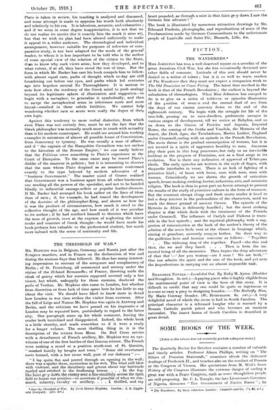FICTION.
THE WANDERERS.•
Miss JOHNSTON has won a well-deserved repute as a novelist of the Omit American Civil War, but she has occasionally deviated into other fields of romance. Latitude of this sort should never be denied to a writer of talent ; but it is as well to warn readers of The Wanderers that they must not expect a companion work to The Old Dominion or Cease Firing. The latest date reached in the book is that of the French Revolution ; the earliest is beyond the calculation of chronologists. What Miss Johnston has essayed to
do is to give us a series of tableaux or episodes illustrative of the position of woman and the eternal duel of sex from
the days of our simian ancestry down to the end of the eighteenth century. We begin with the struggle for life of the tree-folk, passing on to cave-dwellers, prehistoric savages in various stages of development, till we arrive at Babylon, and so on down to the Greece of Pericles and Aspasia, Imperial Rome, the coming of the Goths and Vandals, the Hermits of the desert, the Dark Ages, the Troubadours, Martin Luther, England under Cromwell, ending with an episode in the French Revolution. The main theme is the gradual emancipation of woman, but it is not treated in a spirit of aggressive hostility to man. Amazons play their part in this long panorama, but only as an inevitable incident in the progress of Feminism, not as a final stage in its evolution. Nor is there any indication of approval of Tolstoyan ideals. The early episodes are written in the style of Sagas, with rhapsodic interludes in verse. There is no lack of fighting of a primitive kind ; of beast with beast, man with man, man with woman. Coincidently we are shown the growth of articulate speech, house-making, cooking, barter, industries, arts, and animistic religion. The book is thus in great part an heroic attempt to present the results of the study of primitive culture in the form of romance. But the constant abrupt closes and fresh starts render it hard to feel a deep interest in the personalities of the characters, until we reach the firmer ground of ancient Greece. The episode of the Hermits in Africa is delicately handled ; but the most striking chapter is that which deals with the treatment of the Friends under Cromwell. The influence of Carlyle and Dickens is trace- able in the last episode ; and the mystical philosophy with a Bug. gestion of reincarnation at the back of the author's theory of the relation of the sexes finds vent at the climax in language which, aiming at grandeur, narrowly esear es bathos. On their way to the guillotine hero and heroine converse as follows : " Together ' . . The widening ring of the together. Fused—the this and that, the we and they fused. . . . Then is born the im- mortal being of all the memories. Then begins the deep adventure of that that '—` Are you woman—am I man ? We are both.' " One can admire the spirit and the aim of the book, and yet note the imperfections in carrying out an almost impossible task.


































 Previous page
Previous page